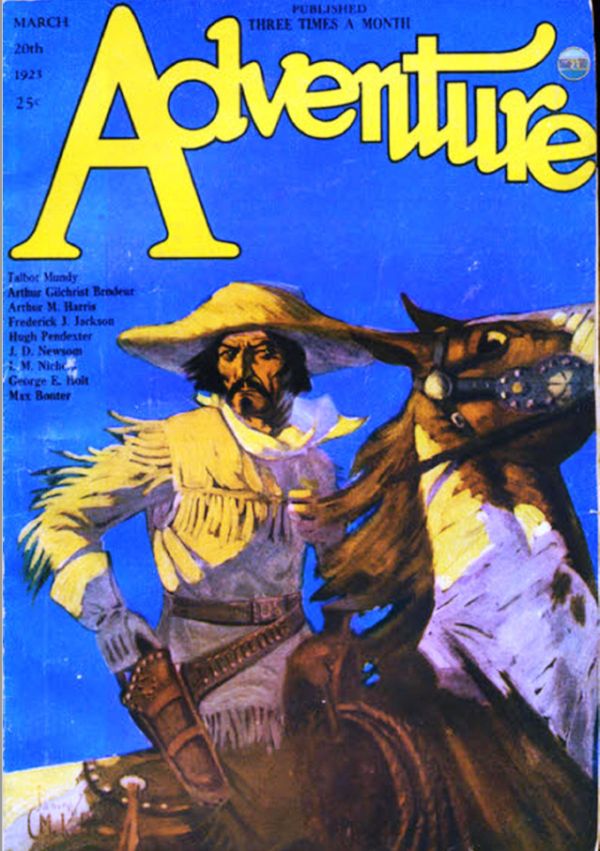The March 20, 1923, issue has the expected assortment of long and short fiction, including two serial parts, filled out with a few short bits and the famed letters column, “The Camp-Fire.” The principal contents are as follows, with my comments.
- Novelettes
- “Bad Men Make Good Pickings,” by Frederick J. Jackson. A former Texas Ranger takes a job as a sheriff to make some money via rewards for captured criminals, and to get revenge on the man who killed his horse and whose family robbed him. The sheriff’s eye for a profit adds an unusual element of practicality to an otherwise common situation in western stories. Recommended.
- “Judgment by Steel,” by Arthur Gilchrist Brodeur. The highlight of the issue may be this novelette. It stars the troubadour and swordsman Cercamon, who, in exile from France, finds a place at the court of the Count of Barcelona, but he must secure that place by extricating the count’s most important vassal from a perilous predicament and at the same time deal with treason that threatens the realm. Recommended.
- Short Stories
- “The Magician of Ombakura,” by J. D. Newsom. Newsom, whose “Angel Face” was among the entertaining stories in the previous issue, returns here with a tale of how a man who lost a leg in a railroad accident finds his niche in the South Seas. Mildly recommended.
- “Stake-Bound,” by Max Bonter. A fighting cook deals with a rebellious crew of laborers, made so because they have too much pay coming to them and are thus “stake-bound.” Not recommended.
- “Mohamed Ali and the Father of Donkeys,” by George E. Holt. Bandit Mohamed Ali devises a clever plan to elude the troops the sultan has sent to capture him; the short story is told with brisk humor. Recommended.
- “The Talking Rock,” by I. M. Nichols. A man goes on a treasure hunt with a treacherous partner in this minor tale, but the characters are unlikeable enough to make the story less than pleasant. Not recommended.
- True Story
“Pirate Tales from the Law: Avery: Back Pay,” by Arthur M. Harris. An account of the career of pirate Harry Avery, chiefly drawn from the statement of a crewmember tried and condemned for the theft of the vessel on which Avery was mate (and instigator of the mutiny). Mildly recommended. - Serials
There are two serials, which I have not read as I do not have all the relevant issues: Part 4 (of 4) of Long Rifles, by Hugh Pendexter, a historical adventure set during the French and Indian War, and the first part of Talbot Mundy’s The Nine Unknown, concerning a secret society dedicated to preserving esoteric knowledge in the face of various threats.

